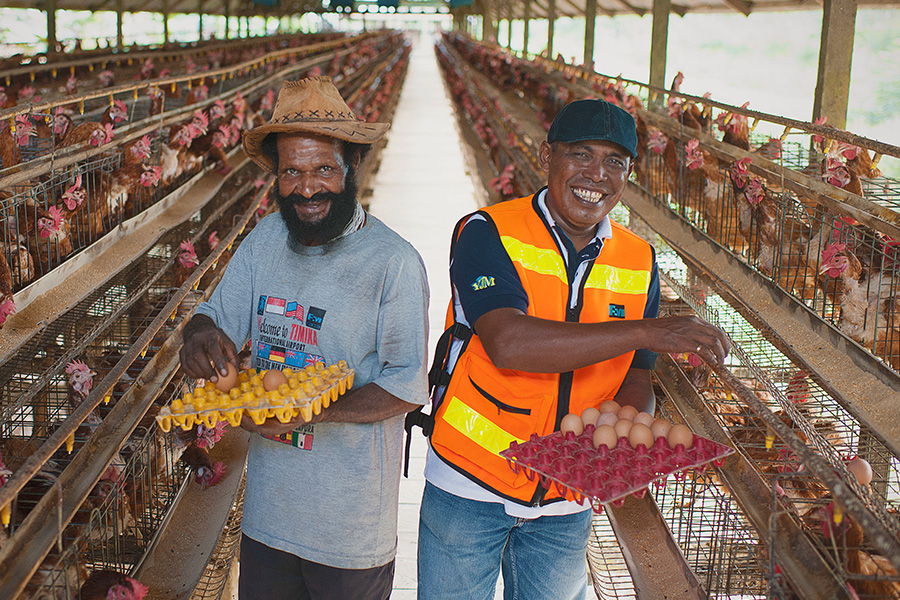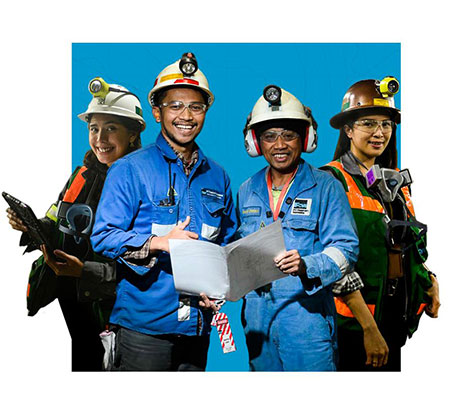26 November 2021

PT Freeport Indonesia is a mining company that is familiar to the people of Indonesia. PT Freeport Indonesia (PTFI) mines and processes ore containing copper, gold and silver. The company operates in Mimika Regency, Papua Province.
For more than five decades, PT Freeport Indonesia has contributed to Indonesia, especially Papua. Various programs are launched to carry out sustainable development in various sectors. Not only the economy, but also health, infrastructure, and education.
One of the interesting things about the development program launched by PT Freeport Indonesia is in the economic field, because it is combined with local wisdom. That way, the community around the mining site can also take advantage of the potential of the area.
1. Supporting mud crab cultivation for traditional fishermen
Freeport Indonesia has collaborated with the Mimika Regency Government, Mimika Diocese Church, USAID, LPMAK, Indonesian Military (TNI), and a number of foundations to provide community development in the fisheries sector since 2006. Support for facilities, infrastructure, and strengthening the capacity of fishermen has been carried out in 14 Mimika coastal villages.
In 2018, PTFI's Department of Social & Local Development (SLD) through Community Economic Development inaugurated a mangrove crab cultivation program for traditional fishermen of the Kamoro tribe. This is done to make it more profitable and beneficial, especially for Kamoro fishermen.
Mangrove crab or karaka is an endemic species of Mimika that has economic value and should be preserved. The role of this crab is able to advance the welfare of the Papuan people.
2. Utilizing local community food products to fulfill PTFI's needs
Octo Magai, a native son of the Amungme tribe, owns a hydroponic garden business as well as General Superintendent Industrial Relations at PTFI. His business is able to empower the local community. In addition, his business also supplies produce for the vegetable needs of all employees within PT Freeport Indonesia.
At the plantation, Octo has employed 50 employees from Papua and outside the region. There are eight assisted groups spread over six different locations, which are Kampung Limau Asri SP5, Kelurahan Wonosari Jaya SP4, Jalan Budi Utomo, Kelurahan Timika Jaya SP2, Irrigation Road, and Mile 32.
The harvested vegetables are accommodated by the Muljaya Papua Food Cooperative. After that, the harvest is supplied to Tembagapura through Pangan Sari to meet the needs of PTFI employees. Apparently, the current harvest is not enough, so Octo plans to open a new hydroponic plantation to meet this need.
3. Development of sago plantations in Nayaro
Sago is a famous eastern Indonesian food. PT Freeport Indonesia has also helped develop sago plantations so that they do not switch functions. This is one of the efforts to achieve food security based on local wisdom and character.
Since 2007, the Maria Bintang Laut Cooperative of Timika Diocese has been working with PTFI to develop an 86-hectare sago plantation in Nayaro Village, New Mimika District. The effort involved 141 heads of Kamoro tribal families. Each resident gets 0.6 hectares of land and the results are used by the local community.
4. The Amungme Plateau is a producer of quality coffee beans
Still supporting the economy by farming, PTFI has a Coffee and Horticulture Agroforestry Program. This program aims to develop the community's economy in the Amungme highlands, focusing on the development of coffee agroforestry.
Through the Jayatani Mandiri Foundation, PTFI assists the community in producing quality coffee beans. In addition, there is also assistance for horticultural crops and cocoa planting.
In 2016, PTFI supported the Prosperous Community Economic Awakening Program (Gerbang Emas) by planting 70 thousand coffee trees in the highlands. In addition, there is also the planting of 10 thousand cocoa trees in the lowlands and 1,000 coconut trees per village on the Mimika coast.
In 2020, there were 158 local farmers who were all indigenous Papuans managing around 35 hectares of land spread across various locations in four highland villages. Sales of coffee products managed by the cooperative reached Rp. 921 million.
5. Pig and chicken farming is an alternative for the local community's economy
Other efforts aside from fisheries, agriculture, and food security, PT Freeport Indonesia also develops animal husbandry. In accordance with the potential of the region and the culture of the local community, pig and chicken farming is an alternative economy. This is inseparable from the infrastructure built by PTFI to support these activities.
This livestock program is focused on lowland areas in Wangirja Village (SP IX) and Utikini Baru Village (SP XII). Meanwhile, livestock in the highlands are in Tsinga, Banti, and Aroanap. That way, the economy is evenly distributed and the community can take advantage of the potential of the region according to geographical conditions.
6. Construction of wholesale centers and kiosks in Otakwa and Manasari
Another PTFI effort to support local businesses in Papua is the construction of wholesale centers and stalls in Otakwa and Manasari. It aims to facilitate the fulfillment of the basic needs of the community. Not only staples for daily use, but also fishing facilities, building materials, spiritual objects, school equipment, to fuel for boats.
Otakwa and Manasari, two villages in the far eastern region of Mimika, were deliberately chosen as locations for the construction of wholesale and stall centers. That way, people in coastal areas do not have to go far to the city center. In addition, PTFI also supports the government's program to make Otakwa an economic center in the eastern region. The construction of wholesale centers and stalls helps in equitable distribution and strengthening the village economy. People don't have to go far to sell their caught fish. The price is always kept relatively the same as in the city.
7. Development of MSMEs to support community economic development
In addition to a number of efforts in these various fields, PTFI and LPMAK provide guidance for Micro, Small and Medium Enterprises (MSMEs) and Revolving Funds for local community economic activities. Papuan entrepreneurs who have the potential to be given guidance and assistance. It aims to improve the local economy and people's standard of living in a sustainable manner.
Assistance is not only for local entrepreneurs, but also housewives to carry out household production activities. Starting from producing noken, sewing, batik, and various other production activities. While the Revolving Fund aims to channel loans to local entrepreneurs who do not meet the requirements to make loans to banks. Local entrepreneurs get education and knowledge about partnerships with banks, making it easier for them to apply for funds with related parties.
Since it was officially established in 1967, it turns out that PT Freeport Indonesia has contributed to the Papuan people. In addition to utilizing local natural resources, PTFI also supports the community's economy. Not only employment and improving the quality of education, but also adapting to local Papuan wisdom.
Kami menghimbau para pencari kerja untuk berhati-hati dan mewaspadai beragam modus penipuan perekrutan yang mengatasnamakan PT Freeport Indonesia. Dalam setiap proses rekrutmen dan penerimaan karyawan, PT Freeport Indonesia maupun konsultan rekruitmennya tidak memungut biaya apapun.
Untuk melihat lowongan, silakan akses melalui link berikut: ptfi e-recruitment
Untuk melihat informasi magang, silakan akses melalui link berikut: Internship Program
